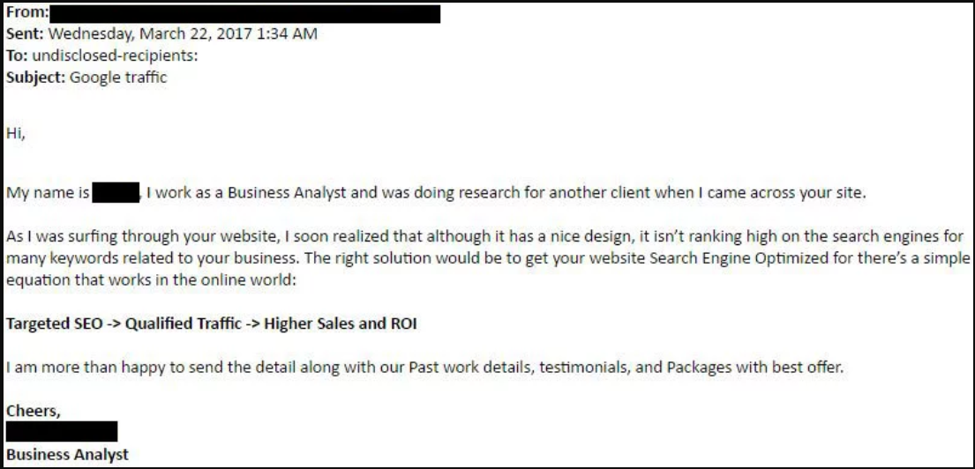
New Year, New SEO Trends. How Do You Know Where to Spend Your Money?
February 4, 2020
Getting Chosen for a Featured Snippet in Google SERPs
March 6, 2020Trusting a third-party agency with your business’ entire online presence can be a huge leap of faith. You’re an expert in your own industry, but odds are good that you’re not also an expert in digital marketing.
To make matters more complicated, we’ve rarely met the business owner who hasn’t been burned by an agency in the past. When you’re counting on a company to generate leads for your business using the internet and they suddenly stop returning your phone calls, it can really put you in a bad position.
Telemarketers and cold email spammers love to prey on these skittish business owners who are nervously handing over significant funds to their outsourced marketing department every month. The whoppers we’ve heard would be funny… if they weren’t so successful at creating doubt and fear which erodes our clients’ trust in us.
If you’re getting spam calls and emails that are planting seeds of doubt in your mind and causing you to distrust your marketing agency, ask yourself if what you’re hearing falls into any of these 4 buckets:
1. Outright Lies
You can hardly call it a tactic, but for someone who may not be as tech-savvy or familiar with the inner workings of digital marketing, telling lies can be an effective approach. Those robo-calls you get from “Google” telling you that your listing is “out of date” is a great example of this. Here are a couple of key pieces of information to help you combat the stress of these calls:
- Google My Business listings don’t expire.
- Google will never, ever robo-call you.
Other types of lies are a little less straightforward to identify. Take a look at the email below:

This was sent to a client who had 288 targeted keywords in the top 10. What keywords was this ‘business analyst’ searching for? Who knows — probably none at all. What even is “Targeted SEO” which will supposedly lead to “Qualified Traffic”? By filling this email with marketing buzzwords and jargon, the spammer is hoping to establish some credibility, but the reality is that he hasn’t included a single fact to back up his claim.
Finally, there is never, ever a “simple equation that works in the online world.” Google’s algorithm has over 600 factors, and it’s always evolving. There will always be a certain amount of educated guesswork going into SEO.
Don’t fall for it: The best weapon against false claims is the truth.
- Call your marketing company and ask them to walk you through the actual data.
- Remember that outside parties DO NOT have access to your analytics data!
- Investigate the company who is soliciting you to see if they have a good online reputation.
2. “Proprietary Software”
It’s not uncommon to get a phone call or a cold email that says “We scanned your site using our proprietary software and found…”
Just stop right there.
Now, “proprietary software” is a term that sounds great. It implies exclusivity or specialization, and to be fair, sometimes that’s a great thing.
In these cases, though, it almost always means that the software (if it exists) has been written to provide whatever results the company who owns it wants it to provide. If someone sends you unsolicited data from their “proprietary software,” you can go ahead and mark that email as spam and get on with the rest of your day.
If you’re seriously concerned, compare their results with reputable software that you already know and trust, like Google or HubSpot. Good data will stand up to scrutiny.
Don’t fall for it: The best data doesn’t come from a black box.
- Compare “proprietary” data with the data from Google Analytics or another reputable platform.
- Remember that outside parties DO NOT have access to your analytics data!
- Investigate the company who is soliciting you to see if they have a good online reputation.
3. Irrelevant Metrics
If you have a good partnership with a reputable digital marketing agency, then we hope you’ve established what your business goals are (including valid KPIs and metrics to define success) and developed a plan to reach them together. If that’s the case, then you should be able to spot examples of being hit with irrelevant metrics by a spammer.
Our favorite example of this is “your site speed is bad…” We get this one all the time. A client gets an email showing a “page speed score” (which may come from Google or also may come from “proprietary software”) that is supposedly less than desirable. The client then remembers that one time when their site did seem to load a bit slowly, and now all of a sudden we have a crisis on our hands — a crisis that means our clients’ faith in us has been shaken.
We wrote a whole blog post about how Google PageSpeed Scores aren’t a valid metric, so if you’ve received this particular scam and want to learn more, please go check it out.
Irrelevant metrics are a huge distraction. Our work is to generate growth for your business in alignment with how you want to grow. Maybe that means generating more traffic to your website, but it could just as easily mean expanding into new geographic markets through paid advertising or closing Sales funnel leaks through email automation. To have that focused be derailed because your site may or may not be loading two-tenths of a second slower than usual is silly — but it’s hard to remember that in the moment.
Don’t fall for it: Does their data speak to your established goals and KPIs?
- Always verify that the data someone sends you is accurate and relevant.
- Remember that outside parties DO NOT have access to your analytics data!
- Ask your marketing agency to review your goals and KPIs with you.
4. Twisted Data Interpretation
In most of these cases, cold callers are using a generalized message to reach as many people as possible, but sometimes they actually do their research. They take time to look at your business and build a case for you to leave your current agency and join them.
The message that they have for you will hit close to home. It’s not hard for an experienced marketer to look at your web presence and marketing channels and figure out where you are truly under-performing.
But as they twist the knife, they’re also prone to twist the truth — showing you all of the bad and none of the good, and telling you that the areas where you’re under-performing spell failure for your business. Their goal is not to showcase their own successes, but to showcase our “failures.”
We’ve seen serious damage done by this kind of behavior — one phone call can put clients on edge for months — but that’s the nature of our industry. Not everyone wants to play nice.
Our advice to anyone who has experienced this kind of sales pitch is to open up a dialogue with your agency. If a phone call from our competitor has struck a chord, we always want to talk about it and find out why. Most of the time this gives us a chance to untwist that data and give a more accurate picture of your progress and growth.
The takeaway here is to always examine the interpretation of data you’re being presented with and see if it rings false. If you’re working with a reputable agency, they will be willing and able to give you a solid, trustworthy explanation.
Don’t fall for it: Is your trust in your current agency being challenged?
- Always verify that the data someone sends you is accurate and relevant.
- Remember that outside parties DO NOT have access to your analytics data!
- Ask your marketing agency to review these negative claims with you and give you their interpretation of the health of your strategy.
- Remember that professional, trustworthy agencies want to be measured by their own successes — not someone else’s failures.
Who can you trust?
Sometimes we feel like we’re fighting an uphill battle in this war for trust. The services we sell are essential for business success, and at the same time they can be vague, overly technical, and subjective. To add to the challenge, the point of entry to become a “marketer” is extremely low, and the noise from this crowd of competitors is drowning out those of us who value transparent and trusting relationships most.
If you’re ready to work with a group of people who want nothing more than to help you succeed — who welcome the opportunity to sit down with you and open themselves up to scrutiny, and who only want to be measured by their own successes — consider giving Waypost Marketing a call.








